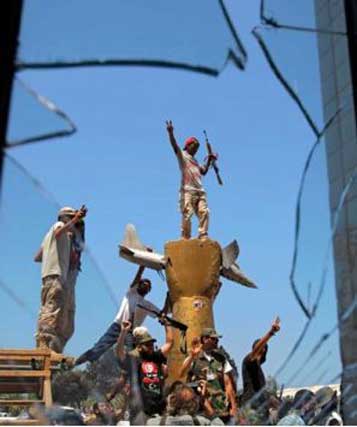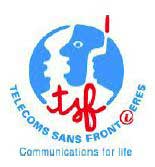
Rebel fighters celebrate as they stand on top of the monument inside the main Moammar Gadhafi compound in Bab Al-Aziziya in Tripoli, LIbya, Wednesday, Aug. 24, 2011. The rebels say they have now taken control of nearly all of Tripoli, but sporadic gunfire could still be heard Wednesday, and Gadhafi loyalists fired shells and assault rifles at fighters who had captured the Libyan leader's personal compound one day earlier. Photo: Sergey Ponomarev / AP
Following this meeting, TSF crossed the border between Tunisia and Libya, at the Dehibat border post in the south of Tunisia. TSF’s objective is:
- To install fixed and mobile connections at Nalut and Jadu, to facilitate the communication of the hospitals in these two towns
- To respond to the needs of the humanitarian community on the ground via mobile satellite solutions, for a better coordination and faster exchange of information between the towns of Jadu, Zintan and Garian
- To install a second fixed hub in Yafran

This movement necessitates supplementary security precautions. Indeed, security still remains a major problem in the western region of the country, and conflicts still persist between Yafran and Tripoli.
Télécoms Sans Frontières is the leading humanitarian NGO specialized in emergency telecommunications. With its 24-hour monitoring centre and relying on its operational bases in Europe, Central America and Asia, Télécoms Sans Frontières (TSF) crews of IT and telecoms specialists can intervene anywhere in the world in less than 24 hours. After a sudden onset disaster or conflict, they can set up in a matter of minutes a satellite-based telecoms centre offering broadband Internet, phone and fax lines. These centres enable emergency NGOs, the United Nations and local authorities to communicate right at the heart of a crisis. They also facilitate the coordination of aid efforts. In parallel, TSF runs humanitarian calling operation to offer support and assistance to affected civilians, giving them a link with the outside world from which they would be otherwise completely cut off. For more information, consult.

